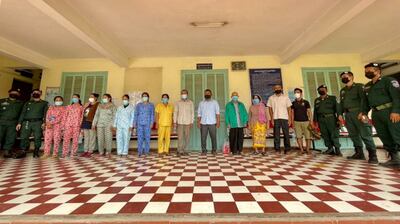A court in Cambodia’s Kampot province is set to question three people accused of producing adulterated rice wine that killed 10 people and sickened 50 others, bringing the country’s death toll from alcohol-related poisoning to two dozen over the past two weeks.
Kampot Provincial Police Chief Mao Chanmathurith told RFA’s Khmer Service that one of the suspects to appear in court on Thursday allegedly bought white rice wine, planning to mix it with traditional herbs to increase its potency before reselling it, but mistakenly raised the drink’s methanol content to levels that could lead to blindness or death.
The police chief said that the two other defendants in the case are the wine’s distiller and a person who helped to sell it after it was altered. All three have been charged with “unintentional homicide” under Article 207 of Cambodia’s Penal Code and face up to three years in prison and a fine of up to six million riel (U.S. $1,480) if convicted.
Yun Phally, Kampot provincial coordinator for rights group Adhoc, told RFA’s Khmer Service that the police need to bring everyone involved in the scheme to justice to prevent further poisoning incidents.
“I received information that the police have not ordered all relevant parties for questioning,” he said. “They should also question the wine’s distributors.”
The 10 deaths from alcohol poisoning in Kampot were among 12 announced by Health Ministry officials on Wednesday and 24 throughout the country in just the past two weeks.
On May 23, the Kandal Provincial Court charged 13 people with “aggravating circumstance of the unfair act with respect to the goods or services or misleading representation due to disability or death” after they allegedly produced an adulterated wine that killed 12 people. The suspects are in pre-trial detention and, if convicted, face up to five years in prison and fines of up to 10 million riel (U.S. $2,460).

Call for vigilance
According to a Ministry of Health report dated May 25, the poisoned wine in both Kampot and Kandal contained levels of methanol that exceeded 5.1 percent, the amount deemed safe for human consumption. In both cases, victims had consumed the toxic wine while gathering at local funerals.
“The Ministry of Health has found that the deaths in Kampot and Kandal provinces were the result of victims consuming rice wine that contained high levels of methanol,” the statement said.
The statement also contained a warning from Minister of Health Mam Bunheng, urging people to stop consuming homemade rice wine.
“The authorities must be vigilant and prevent people from brewing or selling wine without proper standards and inspection,” the minister said.
“Businesses are not allowed to mix methanol with white rice wine, which can lead to poisoning and death.”
Anyone who becomes ill after drinking rice wine should immediately seek medical attention, the statement added.
Education needed
Ouch Vuth, head of Cambodia’s Virtuous Doctor Association, recently told RFA that the ingredients being used to alter rice wine are increasingly being imported into the country from China and neighboring Vietnam, and that local distillers have not been educated on how to properly use them.
He called on authorities to inspect every distiller throughout Cambodia to ensure that they comply with safety regulations or risk more deaths.
“Officials are being careless and are pointing fingers at one another,” he said. “They don’t know their own roles and responsibilities. We need to be educating distillers to ensure their products are safe, but they aren’t doing it.”
Rice wine is regularly shared at social gatherings such as weddings, meetings, and funerals in Cambodia’s rural areas. It is cheap and easily obtainable because it can be brewed from fermented cooked rice.
Last year, at least 15 people died, and dozens were sickened after drinking poisoned rice wine in Kampong Chhnang, Mondulkiri, and Banteay Meanchey provinces, while eight people in Kratie province died from similar causes in 2018.
Reported by RFA’s Khmer Service. Translated by Samean Yun. Written in English by Joshua Lipes.
